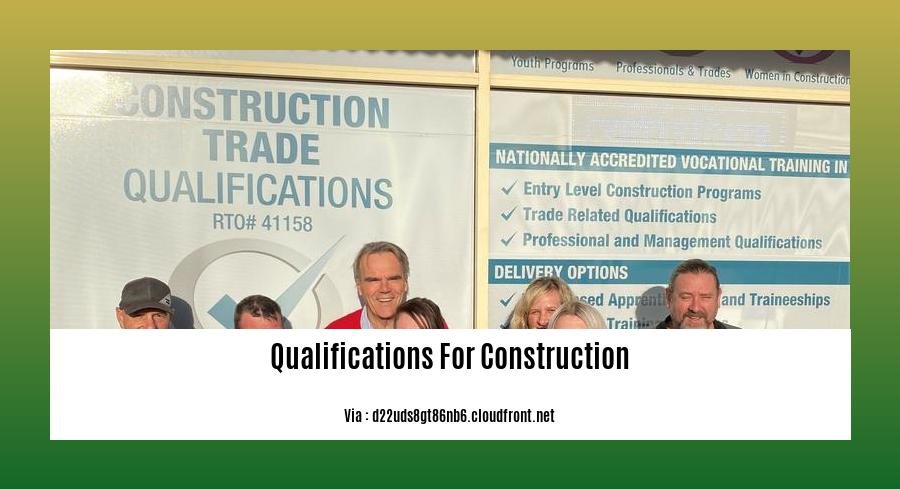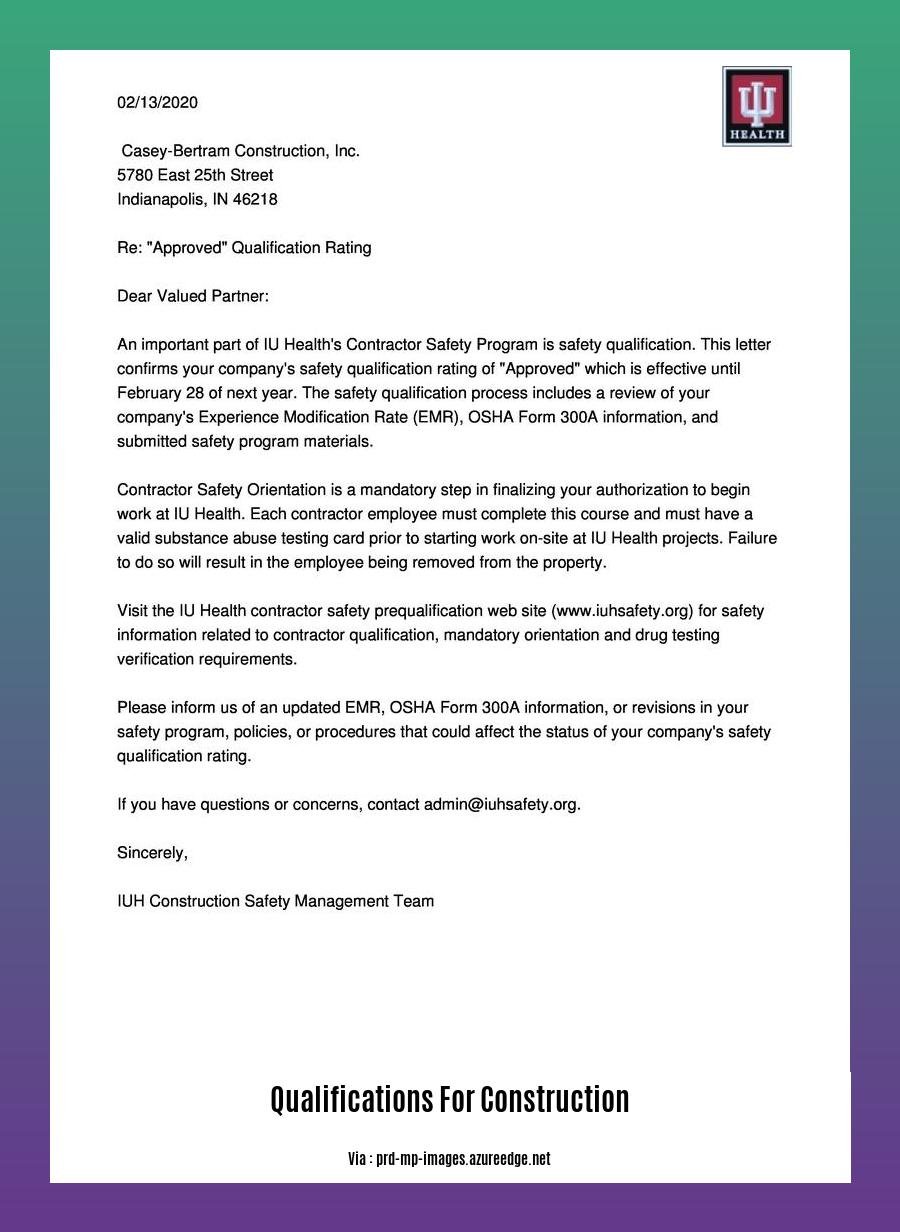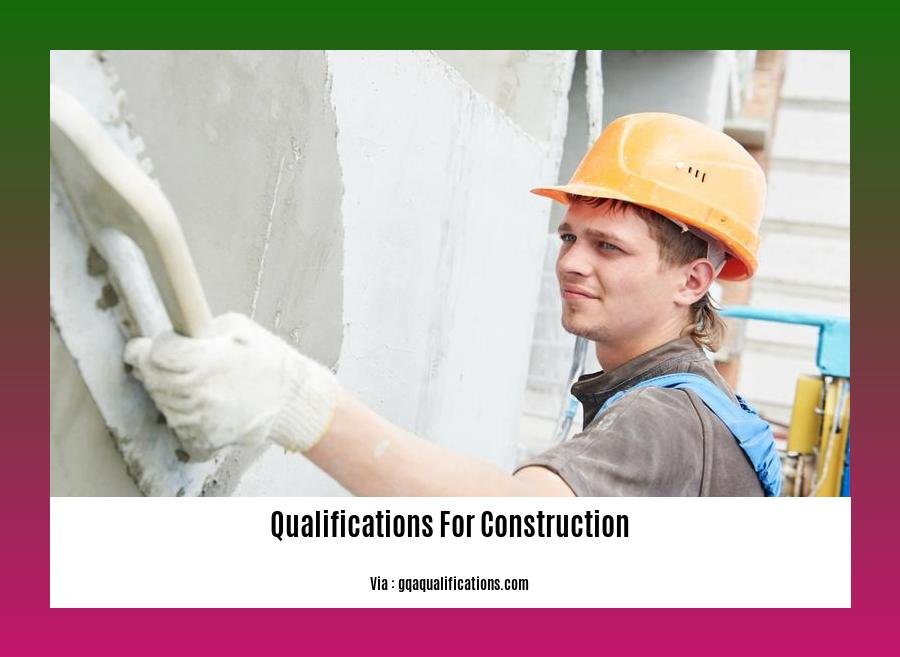Are you interested in a career in construction? Building inspectors are crucial to ensuring the safety and quality of our buildings. In this article, we will discuss the essential qualifications for becoming a building inspector.
Key Takeaways:
- Education: Vocational courses, HNCs, HNDs, or degrees provide necessary training for construction careers.
- Certifications: CHST, PMP, CSM, and OSHA certifications demonstrate competence in safety, project management, and workplace health.
- Skills: Proficiency in trades, construction knowledge, blueprint reading, teamwork, and physical fitness are essential.
Essential Qualifications for Construction Success

To make your career in construction a success, it’s crucial to have the right qualifications.
Education:
- Vocational courses: Provide hands-on training in various construction trades (e.g., carpentry, electrical work).
- Higher education: HNCs, HNDs, or degrees offer advanced technical knowledge for supervisory or managerial roles.
Certifications:
- Construction Health and Safety Technician (CHST): Demonstrates expertise in job site safety and environmental regulations.
- Project Management Professional (PMP): Certifies proficiency in project management principles.
- Certified Safety Manager (CSM): Ensures compliance with safety regulations on construction sites.
- OSHA Certifications: Cover specific aspects of workplace safety and health (e.g., scaffold safety, hazardous waste management).
Skill Sets:
- Technical skills: Proficiency in construction trades (e.g., plumbing, HVAC)
- Knowledge: Understanding of building codes and materials science
- Communication: Ability to convey technical information clearly
- Teamwork: Collaborating effectively with other industry professionals
- Physical fitness: Capacity to work in various construction conditions
By meeting these qualifications, you’ll demonstrate your competence and commitment to the highest standards of construction practice.
To know more about the QA QC Construction Job Description click on the highlighted text.
Do you want to find out QA QC Meaning in Construction? Then click here.
For more about Quality in Building Construction, check this out.
Want to know more about the Quality Management in Construction Projects? Refer to this link.
To see the Quality Management System for Construction Company, please click this one.
Communication and Interpersonal Abilities
In construction, effective communication is key. It ensures seamless collaboration, reduces errors, and enhances project success. Here’s why these abilities are indispensable:
- Clarity prevents chaos: Misunderstandings and ambiguities often lead to expensive mistakes, delays, and even accidents. Effective communication ensures clarity, minimizing errors and ensuring that everyone is on the same page.
- Collaboration builds trust: Open and respectful interpersonal skills foster trust among team members. It encourages feedback, facilitating problem-solving and fostering a positive work environment.
- Safety depends on communication: Clear communication is vital for safety on construction sites. It ensures proper safety protocols are followed and that workers are aware of potential hazards.
Barriers to Effective Communication:
Understanding the barriers to effective communication is crucial:
- Language differences: Construction sites often employ diverse workforces, leading to potential language barriers.
- Noise and distractions: Construction sites are noisy, making it difficult to communicate effectively.
- Poor interpersonal skills: Lack of empathy, active listening, and communication skills hinder effective communication.
Key Takeaways:
- Effective communication starts with setting an example at the top.
- Poor communication can have significant financial and project success impacts.
- Communication barriers in construction include language and cultural differences, lack of clarity in instructions, poor interpersonal skills, and noise and background distractions.
Sources:
- High Speed Training: What is Effective Communication in Construction?
- ProCrew Schedule: 8 Ways to Improve Communication on Construction Sites
Problem-Solving and Critical Thinking
Problem-Solving and Critical Thinking: In construction, problem-solving and critical thinking are crucial for success. These skills enable you to analyze complex situations, identify potential issues, and develop effective solutions. They’re indispensable for ensuring project safety, efficiency, and quality.
How to Develop Problem-Solving and Critical Thinking Skills:
- Analyze Situations: Break down problems into smaller parts to understand their root causes and complexities.
- Question Assumptions: Challenge preconceived notions and explore alternative perspectives to uncover hidden issues.
- Consider Consequences: Evaluate the potential outcomes of different solutions to make informed decisions.
- Collaborate with Others: Share ideas with colleagues and consult experts to gain diverse insights and perspectives.
- Learn from Mistakes: Reflect on past challenges and identify areas for improvement to enhance your problem-solving abilities.
Benefits of Problem-Solving and Critical Thinking in Construction:
- Improved Safety: By identifying and resolving potential hazards, you can create a safer work environment for everyone.
- Enhanced Efficiency: Anticipating and addressing issues proactively streamlines processes and improves productivity.
- Higher Project Quality: Critical thinking ensures that projects meet or exceed standards, resulting in durable and reliable structures.
- Successful Communication: Problem-solving and critical thinking enhance communication by facilitating logical and clear discussions.
Key Takeaways:
- Critical thinking is essential for identifying and solving problems effectively.
- Problem-solving and critical thinking aid in making informed decisions and maximizing project outcomes.
- Collaborating with others and reflecting on mistakes strengthens your problem-solving abilities.
Relevant URL Sources:
- Indeed: Construction Skills
- LinkedIn: How Do You Use Critical Thinking in Your Work?
Continuing Education and Professional Development
As a veteran in the construction industry, I’ve seen firsthand how vital Continuing Education and Professional Development (CPD) is for construction professionals. In today’s rapidly evolving field, it’s more critical than ever to stay abreast of the latest advancements and best practices.
CPD goes beyond formal education; it encompasses a wide range of activities designed to enhance your skills and knowledge. This can include attending conferences, workshops, seminars, and webinars. It also includes reading industry publications, participating in study groups, and actively seeking opportunities to broaden your horizons.
Benefits of CPD
The benefits of CPD are numerous. For professionals, it helps you:
- Stay up-to-date with industry trends and regulations
- Enhance your technical knowledge and skills
- Increase your earning potential and career advancement opportunities
- Maintain and enhance your professional reputation
For organizations, CPD contributes to:
- Improved productivity and efficiency
- Enhanced safety and compliance
- Reduced risk of liability
- Increased client satisfaction and confidence
How to Engage in CPD
Engaging in CPD is a continuous process that requires commitment and dedication. Here are some tips for getting started:
- Identify your learning needs: Determine which areas of your knowledge and skills need improvement.
- Set goals: Establish clear goals for your CPD activities.
- Develop a plan: Outline a plan that includes specific activities, timelines, and resources.
- Seek opportunities: Actively look for opportunities to participate in CPD activities.
- Reflect and evaluate: Regularly assess your progress and make adjustments as needed.
Key Takeaways:
- CPD is essential for construction professionals to maintain and enhance their skills.
- CPD encompasses various activities, including formal education, conferences, and self-study.
- CPD benefits both professionals and organizations.
- Engaging in CPD requires commitment, goal-setting, and planning.
- CPD is a continuous process that helps construction professionals stay relevant and successful.
References:
- CPD UK: Benefits of CPD to Professionals
- CIOB: CPD in Construction
FAQs

Q1: What are the typical qualifications needed for construction careers?
Q2: What certifications are valuable for construction professionals?
Q3: What skills are essential for individuals working in construction?
Q4: What educational pathways are available for those seeking construction qualifications?
Q5: How can individuals ensure they have the necessary qualifications for successful construction endeavors?
Qualifications for Construction: A Comprehensive Guide
Unveiling the [Qualifications for Construction: A Comprehensive Guide], this article delves into the essential credentials and skills required to navigate the diverse and demanding field of construction. Whether you are an aspiring professional or an experienced contractor seeking to enhance your knowledge, this guide will equip you with the foundational understanding necessary to excel in this industry.
Key Takeaways:
- Certifications: CHST, CCM, CPC, CAC, LEED Green Associate
- Education: Vocational courses, industry certifications, skills in estimating, project management, and construction methods
- Market Trends: High demand for skilled workers, emphasis on safety and sustainability
Qualifications for Construction: A Comprehensive Guide
Hey folks!
So, you’ve got your eyes set on a career in construction. That’s awesome! But before you swing that hammer or nail that plank, let’s talk about the qualifications for construction. After all, you want to build a solid foundation for your career, right?
Certification Matters
When it comes to construction, certifications are like gold. They prove you’ve got the knowledge and skills to get the job done right. Here are some heavy hitters in the industry:
- Construction Health and Safety Technician (CHST): Safety first!
- Certified Construction Manager (CCM): The maestro of construction projects.
- Certified Professional Constructor (CPC): The go-to expert for building structures that stand the test of time.
- Certified Associate Constructor (CAC): The future leaders of the construction world.
- LEED Green Associate: For those who care about building sustainably.
Education and Skills: The Cornerstones
Education and skills go hand in hand like peanut butter and jelly. Vocational courses and industry-specific certifications provide the practical know-how you need. And don’t forget about skills like estimating, project management, and construction methods. These will help you turn blueprints into reality.
Market Trends: The Shape of Things to Come
The construction industry is always evolving. Here’s what’s shaping the future:
- Growing Demand: The demand for skilled workers is rising, so your chances of landing a job are higher than ever before.
- Safety and Sustainability: Safety and green building practices are top priorities, so you’ll need to be on top of these trends.
Table of Key Qualifications
| Qualification | Description |
|---|---|
| Certifications | Professional recognition of knowledge and skills |
| Educational Qualifications | Formal training and education |
| Skills | Practical abilities required for construction |
| Experience | On-site work demonstrating competency |
Remember, the right qualifications for construction will set you up for success in this exciting and rewarding field. So, go out there, learn, get certified, and build your future one nail at a time!
Discover the path to a rewarding career with detailed insights into the qa qc construction job description, explore the intricacies of qa qc meaning in construction, and delve into the essential principles of quality in building construction. Understand the quality management in construction projects and uncover the essential components of a quality management system for construction company.
Certifications and Licenses
Certifications and licenses are essential in the construction industry, demonstrating your expertise, enhancing your career prospects, and ensuring compliance with industry standards.
Certifications
Certified Construction Manager (CCM): This certification validates your expertise in construction management, covering project planning, execution, and control.
Certified Associate Constructor (CAC): The CAC provides a broad understanding of construction fundamentals, preparing you for various roles in the industry.
Certified Professional Constructor (CPC): The CPC offers advanced credentials for CAC holders, focusing on project management and leadership skills.
LEED Green Associate: This certification emphasizes sustainable construction practices, highlighting your commitment to environmental responsibility.
Project Management Professional (PMP): Globally recognized, the PMP demonstrates your proficiency in project management principles and practices.
Certified Safety Manager (CSM): The CSM showcases your knowledge of occupational safety and health regulations, ensuring compliance and minimizing workplace hazards.
Residential Concrete Foundation Technician: This certification verifies your expertise in concrete foundation construction, ensuring the structural integrity of buildings.
Note: Other relevant certifications include Construction Health and Safety Technician (CHST), Construction Documents Technologist (CDT), and Quality Control Inspector (CQI).
Licenses
Occupational Safety and Health Administration (OSHA) Certifications: These certifications ensure compliance with OSHA regulations, promoting workplace safety and health.
Contractors Licensing: Many states require contractors to obtain licenses, demonstrating their qualifications and ensuring they meet industry standards.
Benefits of Certifications and Licenses
- Enhanced Expertise: Demonstrates your specialized knowledge and skills,提升你的行业信誉和地位.
- Career Advancement: Makes you a more competitive candidate for supervisory and management positions.
- Increased Earning Potential: Certified and licensed professionals often command higher salaries.
- Industry Compliance: Ensures compliance with industry regulations and safety standards.
- Client Confidence: Reassures clients that you have the necessary qualifications to complete their projects effectively and safely.
Key Takeaways:
- Certifications and licenses validate expertise in construction.
- Certifications like CCM, CAC, CPC, and PMP enhance your skills and career prospects.
- LEED Green Associate focuses on sustainable construction.
- OSHA certifications ensure compliance with safety regulations.
- Contractors licensing ensures qualifications and compliance with industry standards.
Relevant URL Sources:
- 10 Construction Certifications To Advance Your Career
- 17 Construction Certifications To Enhance Your Career
Physical and personal qualities
Physical and personal qualities are essential for success in construction. These qualities include:
- Physical strength and endurance: Construction work can be physically demanding, requiring workers to lift heavy objects and work in uncomfortable positions for extended periods.
- Dexterity and hand-eye coordination: Construction workers need to be able to use tools and equipment precisely and accurately.
- Good communication skills: Construction workers need to be able to communicate effectively with other workers, supervisors, and clients.
- Teamwork skills: Construction workers often work in teams, so they need to be able to work cooperatively and collaboratively.
- Problem-solving skills: Construction workers often face unexpected challenges, so they need to be able to think on their feet and come up with solutions.
In addition to these physical and personal qualities, construction workers also need to have the following:
- Technical skills: Construction workers need to have a good understanding of construction methods and materials.
- Experience: Construction workers need to have experience working in the construction industry.
- Certifications: Construction workers may need to have specific certifications, such as a journeyman’s license or a OSHA certification.
Key Takeaways:
- Physical strength and endurance are essential for construction work.
- Dexterity and hand-eye coordination are necessary for using tools and equipment.
- Good communication skills are important for working with others.
- Teamwork skills are essential for working in a team environment.
- Problem-solving skills are necessary for dealing with unexpected challenges.
Sources:
14 Must-Have Construction Skills to Land a Job
Construction Skills: Definition and Examples (With Tips)
Knowledge and Expertise
Knowledge and expertise are essential for success in the construction industry. Construction workers need to have a strong understanding of construction materials, techniques, and codes. They also need to be able to read and interpret blueprints and specifications. In addition, construction workers need to be able to work safely and efficiently.
There are a number of ways to gain the knowledge and expertise needed for a successful career in construction. One way is to complete a formal education program, such as an associate’s degree or bachelor’s degree in construction management. Another way to gain knowledge and expertise is through on-the-job training. Many construction companies offer apprenticeship programs that allow workers to learn the trade from experienced professionals.
Regardless of how they gain their knowledge and expertise, construction workers need to be committed to continuous learning. The construction industry is constantly evolving, so workers need to stay up-to-date on the latest trends and technologies.
Key Takeaways:
- Construction workers need to have a strong understanding of construction materials, techniques, and codes.
- They also need to be able to read and interpret blueprints and specifications.
- Construction workers need to be able to work safely and efficiently.
- There are a number of ways to gain the knowledge and expertise needed for a successful career in construction.
- Construction workers need to be committed to continuous learning.
Citations:
- 14 Essential Construction Skills to Land a Job
- Skills and Knowledge (With Examples)
FAQ
Q1: What are the most important certifications for construction professionals?
A1: Some of the most important construction certifications include Construction Health and Safety Technician (CHST), Certified Construction Manager (CCM), Certified Associate Constructor (CAC), LEED Green Associate, and Project Management Professional (PMP).
Q2: What educational qualifications are required for a career in construction?
A2: While vocational courses and industry-specific certifications are valuable, a bachelor’s degree in construction management or a related field is typically preferred for managerial and supervisory positions.
Q3: What market trends are affecting the construction industry?
A3: The construction industry is currently facing a growing demand for skilled workers, an increasing emphasis on safety and sustainability, and a need for professionals proficient in digitalization, green building techniques, and management skills.
Q4: What physical abilities are essential for a successful construction career?
A4: Physical strength and endurance, dexterity, and hand-eye coordination are important physical abilities for construction professionals, as they often involve carrying heavy loads, working extended hours, and handling tools and equipment.
Q5: What are some of the cognitive skills required for a construction professional?
A5: Construction professionals should possess strong reading and math skills for measurement calculations and blueprint interpretation, as well as good memory skills for recalling procedures and technical details.
- Dent and Ding Appliances: Find Discounted Appliances Near You - April 15, 2025
- How Much Does It Cost to Replace a Dishwasher in 2024? (A Complete Guide) - April 15, 2025
- Drano vs. Liquid-Plumr: Which Drain Cleaner Works Best in 2024? - April 14, 2025










